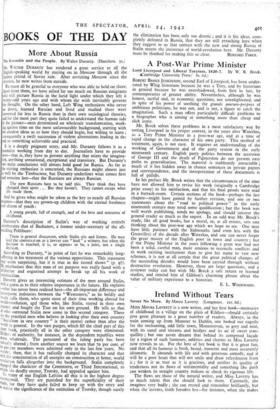BOOKS OF THE DAY
More About Russia
Tbe Kremlin and the People. By Walter Duranty. (Hamilton. 5s.) Ain. WALTER DuRANry has rendered a great service to all the English-speaking world by staying on in Moscow through all the hardest period of Soviet rule. After revisiting Moscow since the invasion, he now writes from outside.
We must all be grateful to everyone who was able to hold on there. Apart from them, we have relied far too much on Russian emigrants who still picture Russia in the lurid light under which they left it twenty-odd years ago and with whom the wish. inevitably governs the thought. On the other hand, Left Wing enthusiasts who never sat down, learned Russian and lived and studied there were interested far less in Russia than in their own sociological theories, and for the most part they quite failed to understand the human side of the picture—men determined on wholesale transformation, work- ing against time on the most unfavourable background, starting with the crudest ideas as to how they should begin, but willing to learn ; consequently a swift succession of violent alternations leading in the end to something achievable and practical.
It is a deeply poignant story, and Mr. Duranty follows it as a journalist working from day to day. Journalists have to provide news—that is, they have to present anything that seizes the imagina- tion, anything sensational, exceptional and transitory. But Duranty's two main conclusions will always hold good for Russia. As far as the visiting enthusiast is concerned, the Russians might almost just IS well be the Timbuctese, but Duranty underlines what comes first and remains last—that the Russians are always Russian.
The new Russians hate to be told this. They think they have changed their spots . . . But they haven't. They cannot escape what life made them.
And he gives what might be taken as the key to nearly all Russian enigmas—that they are grown-up children with the eternal freshness and charm of youth :
A young people, full of strength, and of the heat and nonsense of childhood.
Duranty's description of Stalin's way of working entirely aroborates that of Bazhanov, a former under-secretary of the all- deciding Politburo: There is general discussion, while Stalin sits and listens. He may lead the conversation as a lawyer can " lead " a witness, but when the decision is reached, it is, or appears to be, a joint, not a single decision.
According to Duranty, "in point of fact he was remarkably long- buffering in his treatment of the various oppositions. This statement May seem surprising, but it is true as the record shows " (p. 97). lie emphasises that this man of set purpose was really faced with a deliberate and organised attempt to break up all his work of construction.
Duranty gives an interesting estimate of the men around Stalin, with a guess as to their relative importance in the future. He explains -what has never been realised here—the all-important difference and consequent jealousies_ between the " Westerners," as he boldly and wisely calls them, who spent most of their time working abroad for werld-revolution, apd those who, like Stalin, stayed in their own ,country and fought the Tsar on his own ground. He tells us that 'ill who surround Stalin now come in this second category. These are the practical men who believe in looking after their own country , li`Socialism in one country " is their motto) rather than after the Iworld in general. In the vast purges, which fill the chief part of this shall book, practically all in the other category were eliminated. Holders of authority, for instance, in the dependent republics went dawn. wholesale. The personnel of the ruling party has been radically altered; another source we learn that 70 per cent, of ti present memers were admitted only in the last few years. No wonder, then, that it has radically changed its character and that nth the concentration of all energies on construction at home, world revolution falls altogether into the background. Stalin completely changed the charicter of the Comintern, or Third International, to *ich his deadly enemy, Trotsky, had appealed against him. To many of our English Leftists all this is in the highest degree cccongenial. They arc punished for the superficiality of their 144, for they have quite failed to keep up with the story and is realise the significance of the extinction of Trotsky, though surely
the elimination has been only too drastic ; and it is his ideas, com- pletely defeated in Russia, that they are still preaching here when they suggest to us that contact with the new and strong Russia of Stalin means the insistence of world-revolution here. Mr. Duranty
must be thanked for making this so clear. BERNARD PARES.






















 Previous page
Previous page